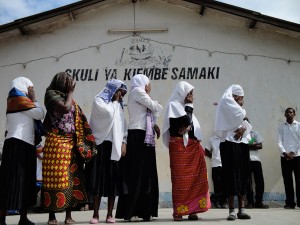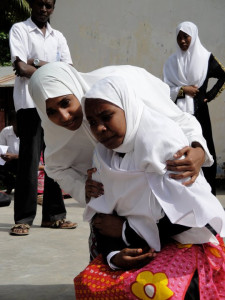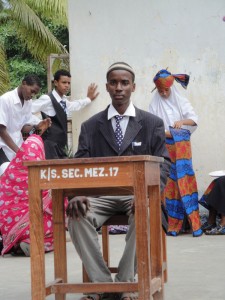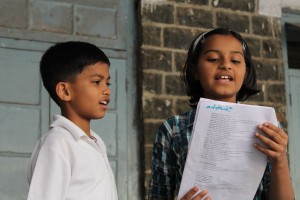“Our stage is a place where issues of injustice and gender inequality are at last expressed and explored.” -Jennifer Holmes, Ph.D.

Hiding faces during a performance of “Women Silenced”
Through dramatic activities, ensemble work and playwriting, GET invites students to tell stories about their lives, concerns and dreams. Students construct their own scenes, poems and songs focusing on their experiences in their communities. GET workshops offer students opportunities to practice the art of storytelling and gives students a chance to voice issues that are important to them and to their communities.
Drama allows students to rehearse and try out roles that they do not normally play in their “real world” lives. Students are free to envision new roles for themselves filled with possibility. Girls can envision themselves as community leaders or in jobs not usually open to them. Many girls simply imagine a world in which they are free to voice their opinions or concerns. Boys deepen their understanding of, and empathy for, the struggles of girls by “living through” these struggles with their female peers onstage.
Students are empowered by the act of self-expression and the experience of playing someone “stronger” or “more accomplished” than themselves. Playing the role of someone “different” from them helps develop empathy.
Our experiential, student-centered approach builds confidence and encourages active participation in the learning process.

A young girl weeps after she learns of an arranged marriage in a scene from “Too Young to be Married”
Helping students find their voice
One of our objectives is to make sure that each student participating in the workshop has an opportunity to share their own voice and that no one’s experiences are overlooked. We involve the students at every stage of the playwriting process to ensure that their final performances truly represent their voices. Our aim is to create theatre that comes directly from our students’ culture and experiences, theatre that reflects their unique concerns.
Engaging the community

A scene from “The Judge” about government corruption in Zanzibar.
We engage the community by inviting them to the final performance. Issues and concerns familiar to the community are given a public forum through the medium of live performance. Our goal is to promote constructive dialogue around these issues.
Together, students and their communities gain new insights and openly discuss the challenges they collectively face.
Our work transforms children into the thought leaders and conscience of their communities.
Our unique approach:
-
- Provides a safe environment in which children are encouraged to discover their unique voices and share their perspectives, observations, fears, and frustrations.
- Offers boys and girls the unique opportunity to examine their roles in society, critically think about these roles and potentially change their behavior both in the classroom and outside of it.
- Helps boys become of aware of the need to ally with girls to improve their communities and contribute to a more just world.
- Offers girls the opportunity to build confidence, creativity, leadership skills, and deepen their investment in education and future careers.
- Expands self-concept and empathy for others through the act of creative expression and the use of dramatic role-play.
- Changes the culture in schools by encouraging a student-centered alternative to current models of education that privilege rote-memorization and teacher-centered methods.
We develop and deepen important life skills

Boys learn to ally with girls through collaborative storytelling.
Healthy self-concept
Creativity
Empathy
Self-expression
Interpersonal relationship-building
Collaborative problem-solving
Social responsibility
Critical thinking
Story-telling
English literacy
How we measure SUCCESS:
-
- Promotion of open dialogue between members of the community and an awareness of the need to work collaboratively to address the challenges faced by the community as a whole.
- An increase the number of girls seeking out and acquiring leadership opportunities in their communities and beyond.
- A change in the culture of the classroom marked by an increased awareness of gender stereotypes and the use of experiential, interactive instruction techniques.
- Boys and girls demonstrate a deeper understanding of issues affecting their community and are inspired to contribute to positive change.
- Children living in poverty are given their rightful place on the world’s stage to share their stories.
- A new generation of world-citizens is created. GET students experience positive interaction with teachers from Western cultures, challenging negative stereotypes and deepening cross-cultural understanding.